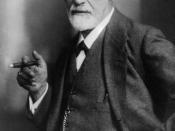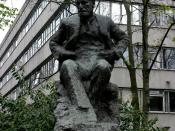A naval ship comes to the island after seeing the blazing fire in the jungle. After being chased by the savage hunters with sharp wooden spears, Ralph ends up on the beach where he collapses in exhaustion. He looks up to see a naval officer standing over him. A sudden realization comes to him that he is safe and will be returned to civilization but plunges him into a reflective despair. "Ralph wept for the end of innocence, the darkness of man's heart, and the fall through the air of a true, wise friend called Piggy." This passage from chapter 12 proves very effective in concluding Golding's famous novel, Lord of the flies. The rescue is not a moment of unequivocal joy, for Ralph realizes that, although he is saved from death on the island, he will never be the same. Through Ralph's scarred psychology, this intriguing passage lightly recaps on the horrific consequences that took place on the island.
From the beginning to the end of the story we see the disintegration of innocence. As story progresses so does the gradual decomposition of common good. We see this perfectly in some boys more than others, especial Roger. Nearer the beginning, in chapter 4 it is clear that the politically disordered island has not yet had its great influence on the boys, but we do see and indication. Almost like a prophecy of what's to come. "Roger gathered a handful of stones and began to throw them. Yet there was a space round Henry, perhaps six yards in diameter, into which he dare not throw. " Golding uses this passage to show how Rogers protected old life at an English private school still influences his decision-making and controls the darkness within. Then Roger starts to throw the stones...


